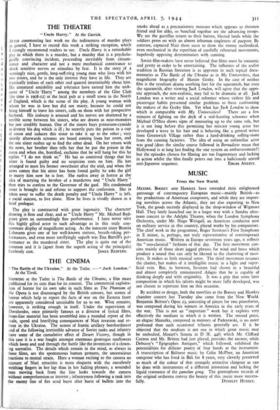From the New World.
MUSIC
MESSRS. BOOSEY AND HAWKES have extended their enlightened patronage of contemporary European music—mainly British—to the productions of American composers, and while they are import- ing novelties across the Atlantic, they are also exporting to New York, the goods recently displayed in the shop-window of Wigmore Hall. They lately launched out in a larger way with a Sunday after- noon concert in the Adelphi Theatre, when the London Symphony Orchestra, under Mr. Hugo Weisgall, an American conductor now on military service in this country, played works by his compatriots. The chief work in the programme, Roger Sessions's First Symphony in E minor, is, perhaps, not truly representative of contemporary American music. Written in Europe seventeen years ago, it reflects the " neo-classical " fashions of that day. The first movement con- sists mainly of those short jagged phrases for wind and brass which produce a sound that can only be likened to the chattering of mon- keys. It makes as little musical sense. The third movement resumes the chatter, but makes of it intelligible music in a light and super- ficial vein. But, in between, Sessions had shown in a beautiful and almost completely unmannered Adagio that he is capable of thinking deeply and with originality. It was a pity that some later composition in which his talents might be more fully developed, was not chosen to represent him on this occasion.
By accident or design, both the novelties at the Booscy and Hawkcs chamber concert last Tuesday also came from the New World. Benjamin Britten's Opus 23, consisting of pieces for two pianofortes, was composed during his sojourn in America in the early years of the war. This is not an " important " work but it exploits very effectively the medium in which it is written. The second piece, an elegiac Mazurka, composed in memory of Paderewski, is no more profound than such occasional tributes generally arc. If it be objected that the medium is not one in which great music may be embodied, Mozart's Sonata in D (K. 448) which Mr. Clifford Curzon and Mr. Britten had just played, provides the answer, while Debussy's " Epigraphes Antiques," which followed, exhibited the potentialities for delicate poetry of four hands at the instrument. A transcription of Balinese music by Colin McPhee, an American composer who has lived in Bali for 8 years, very cleverly preserved as much of the colour of that strangely attractive clangour as can be done with instruments of a different intonation and lacking the liquid resonance of the gamelan gong. The gramophone records of the original orchestra convey the beauty of this music more success-


























 Previous page
Previous page